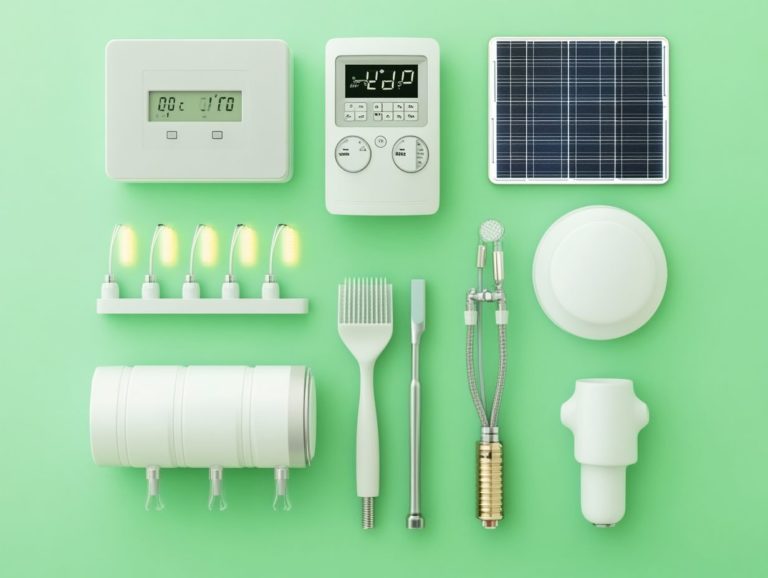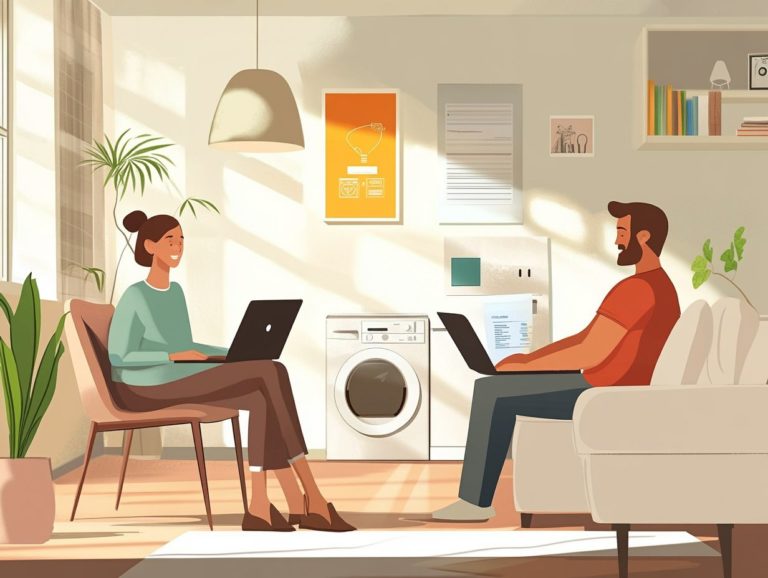How Energy Audits Can Save You Money
Energy audits are invaluable resources for those aiming to optimize energy consumption and reduce costs!
This article delves into what an energy audit involves, highlighting its many benefits and the various types available for both residential and commercial properties.
You ll discover the steps necessary to conduct an audit and how to implement energy-efficient solutions. We ll also cover effective strategies for tracking your energy savings.
Whether you’re a homeowner or a business owner, understanding energy audits can lead to significant financial savings while positively impacting the environment.
Contents
Key Takeaways:

Energy audits are a cost-effective way to save money and reduce environmental impact. Different types of energy audits exist for both homes and businesses, and understanding why you need regular energy audits can help ensure you implement energy-efficient solutions. Tracking energy savings is also a crucial step in the process.
What is an Energy Audit?
An energy audit is a thorough check of your building s energy performance. It aims to uncover how energy is utilized and where inefficiencies may exist.
Typically carried out by a skilled auditor, this process includes a detailed assessment of systems such as heating, cooling, insulation, and potential air leaks.
The objective is to identify opportunities for energy savings that improve your comfort and lead to substantial reductions in utility bills over time.
Definition and Purpose
An energy audit analyzes energy consumption patterns within a building to enhance energy efficiency. The goal is to find areas where energy is wasted and propose actionable solutions to improve overall performance.
This process requires careful inspection of various systems, including heating, cooling, lighting, and insulation. By examining these components, you gain valuable insights into your energy usage.
Identifying inefficiencies may reveal opportunities to cut those pesky utility bills!
Energy audits are crucial in home assessments, guiding both homeowners and business managers to prioritize upgrades that promote sustainability. Following recommendations from these assessments can lower energy costs and foster a healthier environment.
Ultimately, the aim is to create a more efficient space that meets the needs of its occupants while minimizing the carbon footprint.
Why You Need an Energy Audit Today!
Energy audits offer fantastic benefits, not just in savings but also for our planet.
By pinpointing energy hogs and inefficiencies within your building, you can create a tailored energy savings plan that may qualify for enticing financial incentives, such as tax credits and rebates.
These enhancements not only lower your energy costs but also play a vital role in conserving energy and protecting our environment.
Cost Savings and Environmental Impact
Energy audits can unlock significant cost savings by identifying outdated systems that waste excessive energy, and they play a crucial role in understanding how energy audits help reduce carbon footprint, ultimately benefiting the environment.
For instance, a recent case study from a manufacturing facility showed that by implementing energy audit recommendations, they achieved a remarkable 25% reduction in electricity expenses resulting in thousands of dollars saved each year!
In another case, a commercial building improved its efficiency by upgrading its heating, ventilation, and air conditioning (HVAC) systems, significantly lowering its carbon footprint.
Statistics indicate that buildings engaging in regular energy assessments can achieve an impressive average of 30% energy savings. This not only reduces operational costs but also contributes to a more sustainable ecological footprint, benefiting both your bottom line and the planet.
Want to reduce your energy bills and help the environment? An energy audit is the way to go!
Don’t miss out on the savings and environmental benefits! Schedule your energy audit now and learn how to maximize your energy audit results to start saving.
Types of Energy Audits

Energy audits can be divided into commercial and residential types. Each type addresses unique energy needs and performance goals.
A commercial energy audit focuses on larger buildings, offering detailed assessments of HVAC systems and other energy-consuming components.
In contrast, a residential energy audit uses a home energy audit checklist to identify small-scale enhancements that can make a significant difference.
DIY energy audits allow homeowners to start the evaluation process on their own, providing an approachable way to achieve greater energy efficiency.
Home vs. Business Audits
Home energy audits and commercial energy audits serve different purposes, but they share a common goal: enhancing energy efficiency.
Home audits concentrate on reducing energy use in individual residences. They identify issues like air leaks, insulation deficiencies, and inefficient appliances.
Conversely, commercial audits take a more comprehensive approach, examining an entire facility’s operations, including heating, cooling, and lighting systems.
For example, a home energy audit might recommend upgrading to Energy Star-rated appliances or improving insulation in attics and walls. To learn more about the process, check out understanding energy audits, which can lead to lower utility bills.
A commercial audit may suggest installing advanced HVAC control systems or using smart lighting technologies to help businesses cut operational costs while meeting sustainability goals.
Steps to Conduct an Energy Audit
Conducting an effective energy audit requires a systematic approach, starting with collecting data on the building’s energy usage and how it is used.
You’ll typically use advanced tools, like infrared cameras special cameras that detect heat loss and perform a blower door test to find air leaks and inefficiencies.
Understanding these data points is crucial for diagnosing energy challenges and identifying effective energy-saving strategies.
Gathering Data and Identifying Inefficiencies
In the initial phase of your energy audit, focus on gathering essential data about energy consumption, how the building is used, and identifying inefficiencies.
Start by reviewing your utility bills; these documents reveal patterns of energy use over time and highlight peaks that may indicate waste.
If you have previous energy audits, examine those to see what actions were taken in the past and their effectiveness.
With this information, you can easily analyze trends and spot issues. This thorough approach helps you catch everything that needs attention, giving you a clearer picture of energy flows and opportunities for impactful energy-saving interventions.
Implementing Energy-Efficient Solutions
After identifying key areas for improvement in your energy audit, the next step is to implement energy-efficient solutions.
You can start saving money right away by upgrading to high-efficiency appliances, improving insulation, or joining a weatherization program to optimize building performance.
These strategies are not only designed to reduce energy consumption; they also enhance comfort and lower energy costs over time.
Cost-Effective Strategies for Saving Energy

By using cost-effective strategies to save energy, you can significantly reduce both energy use and your utility bills while optimizing systems like your HVAC.
One effective method is installing energy-efficient lighting systems, such as LED bulbs. They consume less power and last much longer than traditional options.
Integrating smart thermostats allows you to manage heating and cooling precisely, adapting to your daily routines. Homeowners using these technologies often report savings of 10-20% on energy bills.
This shows how simple upgrades can lead to significant financial benefits while positively impacting environmental sustainability.
Don t wait! Start your journey to energy savings today!
Measuring and Tracking Energy Savings
Measuring and tracking energy savings is essential. It helps you assess the effectiveness of your energy-efficient solutions and maintain energy management.
By utilizing tools and techniques like energy benchmarking, which involves comparing your energy use to similar buildings, you can closely monitor your energy usage patterns over time. This data-driven approach showcases your successes and helps you pinpoint areas for further improvement.
Tools and Techniques for Monitoring Usage
Using the right tools and techniques to monitor energy usage offers valuable insights into your consumption patterns, allowing you to identify trends over time.
Smart meters have become a popular choice in this realm. They grant you access to real-time data on your energy use. These devices provide immediate feedback and help you spot anomalies that could lead to significant savings.
Energy management software, which helps you see how much energy you use and when, plays an essential role in analyzing this data thoroughly. It enables you to track your consumption across various time periods and pinpoint peak usage times.
By effectively harnessing these technologies, you can make informed decisions, optimize your energy consumption, and contribute to sustainability efforts.
Frequently Asked Questions
What is an energy audit?
An energy audit is a thorough evaluation of a building’s energy usage. It identifies areas where energy efficiency can be improved.
How can an energy audit save me money?

An energy audit can save you money by identifying areas where energy is wasted and recommending cost-effective solutions. To maximize the benefits, consider exploring how to make energy audits work for you.
Who can benefit from an energy audit?
Anyone who owns or manages a building, whether it’s a home or a commercial property, can benefit from an energy audit. Learning how to conduct an energy audit on a budget helps save money on energy bills.
What are some common areas where energy is wasted in buildings?
Common areas where energy is wasted include leaky windows and doors, inadequate insulation, outdated heating and cooling systems, and inefficient lighting.
How much money can I save with an energy audit?
The amount you can save varies depending on the size and condition of your building. On average, businesses can save up to 30% on energy bills, while homeowners can save up to 10%.
What are the long-term benefits of getting an energy audit?
In addition to immediate cost savings on energy bills, an energy audit can increase the value of your property, improve indoor air quality, and reduce your carbon footprint. Discovering the benefits of professional energy audits makes it a smart long-term investment!
Don’t wait! Schedule your energy audit today to start saving!






